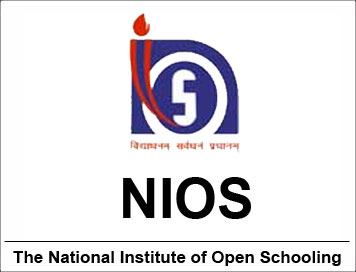(Download) NIOS Syllabus Of Chemistry Senior Secondary
Disclaimer: This website is NOT associated with CBSE, for official website of CBSE visit - www.cbse.gov.in
(Download) NIOS Syllabus Of Chemistry Senior Secondary
NATIONAL OPEN SCHOOL
Senior Secondary Curriculum in Chemistry
RATIONALE
According to present scheme of school education at Senior Secondary stage, chemistry emerges out as a separate discipline. It is this stage where major emphasis is to be laid on providing suitable conceptual foundation The present chemistry course has been developed basically around the themes: Why do chemical reactions occur? What is the quantitative relationship among reacting constituents in a chemical reaction? How far andhow fast will a chemical reaction proceed under a given set of conditions? Can we predict whether a chemical reaction willoccur or not? What is the relation between the structure of a chemical substance and its functions/properties? In What way is a chemical reaction relevant for getting new types of substances and materials for dialylife and chemical industries?
In the present course, there in no compartmentalisation like physical, inorganic and organic chemistry. However, basic chemical concept considered necessary in the study of descriptive chemistry (inorganic and organic) are provided in the beginning of the course and an effort has been made to provide a disciplinary structure to chemistry and, therefore, a logical sequencing of concepts in provided. Applications of chemistry in daily life have been interwoven with the conceptual themes in such a way that learners can appreciate the importance of the study of chemistry relevant to daily life and in the economic development of the country. Some interdisciplinary aspects have also been provided to make the course more meaningful and cunctional.
OBJECTIVES OF THE COURSE
It is expected that a learner will be able to:
- understand the principles, theories and laws of chemistry responsible for various chemical processes/ reactions,
- realise the role of chemistry in production of many elements (metals/non-metals) and compounds useful in industries and daily life,
- appreciate the chemical nature of inorganic and organic substances around him/her,
- choose various vocational, professional and applied courses of his/her choice based on knowledge of chemistry gained.
Apart from this, the present course also aims at developing the following capacity in the learner:
- perform chemical calculations to know about the chemical reactions and chemical compounds,
- explain chemical reactions, concepts and phenomenon, develop awareness about uses and abuses of chemical substances,
- develop skills arranging/setting aparatus, handling apparatus and chemicals properly, and
- analyse and synthesise simple compounds.
SPECIAL FEATURES OF THE COURSE
The academic standard of the present chemistry course in comparable with the chemistry course of any State Education Board or Central Board of Secondary Education, New Delhi. Considering the nature of open learning system, it has not been found desirable to divide the course into class XI and class XII. The rationale behind the course is that every lesson has a role to play in understanding the holistic view of chemistry.
The course also provides optional modules ‘mostly of applied nature’ out of which a student can choose one module according to his/her choice of career. Thus, there are seven core modules and two optional modules. A student appearing for senior secondary examination is expected to offer all the seven core modules, one Module out of two optional modules, and practicals. All the core and optional modules are listed below:
CORE MODULES |
|||
S.No. |
Module |
Marks Alloted |
Study Hours |
| 1. | Atom Molecule and Chemical Arithmatics | 7 | 14 |
| 2 | Atomic Structure and Chemical Bonding | 12 | 33 |
| 3. | States of Matter | 12 | 18 |
| 4. | Chemical Energetics | 8 | 23 |
| 5. | Chemical Dynamics | 8 | 19 |
| 6. | Chemistry of Elements | 10 | 48 |
| 7. | Chemistry of Organic Compounds | 12 | 48 |
OPTIONAL MODULES |
|||
| I. | Environmental Chemistry | 15 | |
| II. | Chemistry and Industry | 37 | |
| Total | 80 | 240 | |
A detailed curriculum is given for your ready reference
